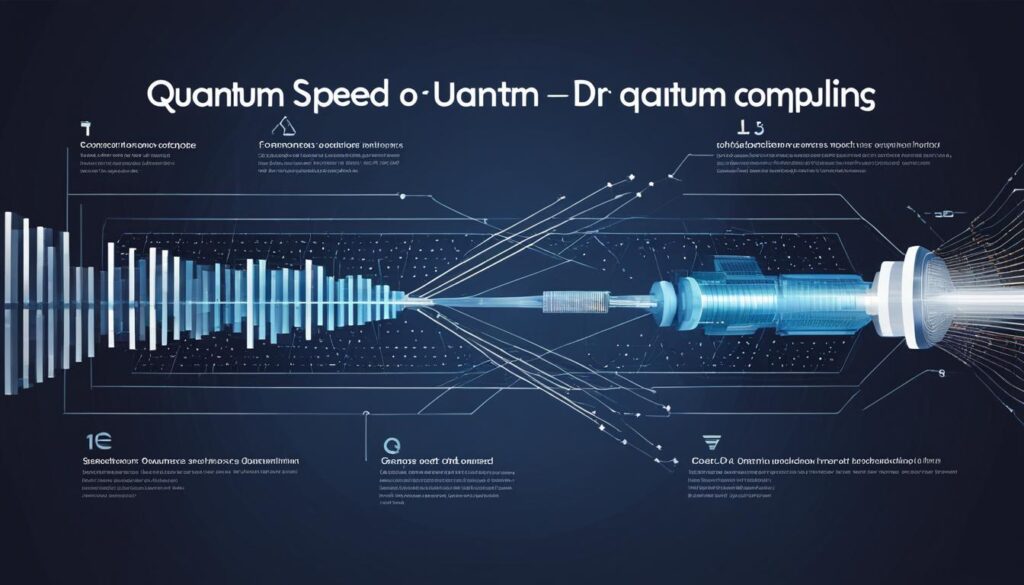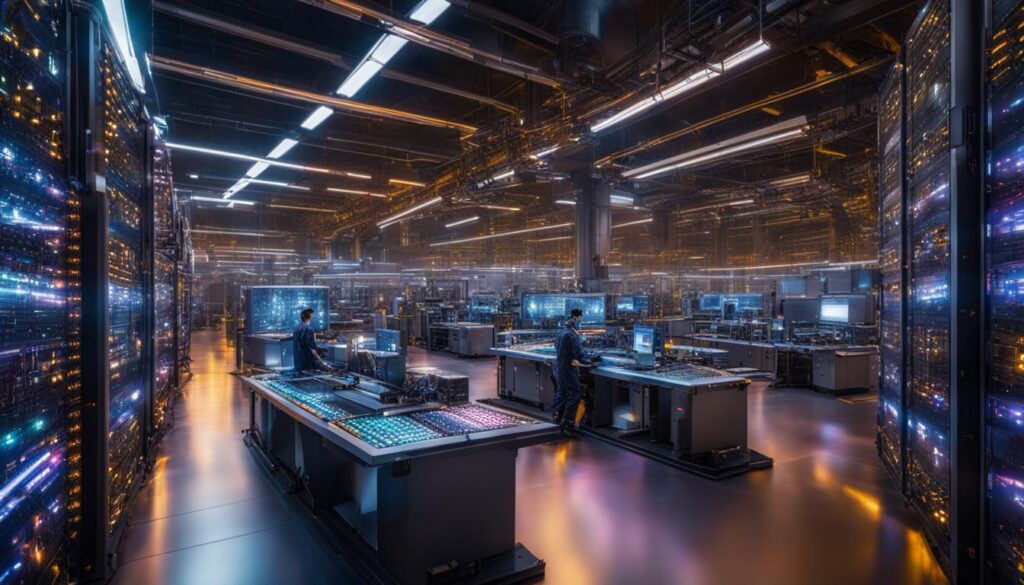The dawn of quantum computing brings with it promises of astonishing computational capabilities that could redefine the norms of processing power. With extensive research and continuous breakthroughs hinting at a future where the question ‘how fast is a quantum computer?’ sees its answer in groundbreaking figures, expectations are sky-high. Quantum computer power is harnessed from the peculiar principles of quantum mechanics, opening a pandora’s box of processing speeds previously deemed unattainable.
The race to unlock the secrets of quantum computing speed has brought forth innovations that stand to challenge everything we know about data processing. Observations from leaders such as Google and NASA shed light on the potential of a quantum realm, where problems securities that would tie down conventional computers for millennia can be deciphered in the blink of an eye. This unprecedented ability will not just enhance the compute-speed but revolutionize it.
As we stand on the cusp of this technological renaissance, it is not just the awe-inspiring speed that captures our imagination, but the exponential leap in problem-solving abilities that quantum computers are poised to offer. The conversation about quantum computer power is not about the substitution of classic computing, but a transcendence to complement and expand the horizons of mankind’s computational prowess.
Key Takeaways
- The notion of ‘quantum computing speed’ is marked by a paradigm shift from classical bits to qubits, with potential speeds surpassing current computing standards.
- Quantum mechanics underpin an exponential increase in processing power, distinguishing how fast quantum computers will operate compared to traditional systems.
- Google’s D-Wave quantum computer exemplifies the future of problem-solving, managing tasks 100 million times faster than previously possible.
- Understanding the core of quantum computing—the states of superposition and entanglement—reveals the source behind the quantum leap in computing speed.
- Steve Johnson’s research at NIST suggests that theoretical limits on quantum computer power are not as constrained as previously speculated.
- While niche in their applications, the speed and efficiency quantum computers bring to the table are slated to redefine sectors like optimization and data security.
- Emerging quantum computational architectures promise to unlock speeds and efficiencies beyond even the boldest of current predictions.
Understanding Quantum Computing Technology
As the digital world progresses at a breakneck pace, the emergence of quantum computing stands as one of the most exhilarating developments in information technology. At the heart of this leap forward is a radical shift in how data is processed and analyzed, overthrowing classical paradigms and setting the stage for unprecedented computational might.
Classical vs Quantum: The Basic Differences
The conversation surrounding how fast will quantum computers be is grounded in the fundamental differences between classical and quantum computing. Traditional computers rely on bits as the smallest unit of data, which can either be a 0 or a 1. This binary system has powered the digital era thus far. In contrast, quantum computing introduces qubits, which transcend this binary limitation and exist in multiple states simultaneously, paving the way for a surge in quantum processor speed.

What Makes Qubits So Powerful?
The power of qubits lies in their ability to hold and process a myriad of probable states before landing on a final answer, unlike classical bits which process sequentially. This intrinsic capability is referred to as superposition, and it’s a game-changer for computational efficiency and speed. With the augmentation of qubit power, quantum computers offer the promise of tackling complex computations that classical computers could never achieve in a feasible timeline.
Superposition and Entanglement: The Heart of Quantum Speed
The terms superposition and entanglement are more than just buzzwords; they are the very core principles enabling this leap in quantum processing speed. Superposition allows qubits to perform multiple calculations at once, while entanglement ensures speedy execution by instantly correlating the properties of one qubit with another, even over vast distances.
The continued exploration into quantum mechanics bodes well for how we approach and solve tomorrow’s challenges. The scope and speed of quantum computing beckon a new era for industries far and wide, cheering on innovators who look beyond the visible horizon. It’s not just about how fast these machines will solve problems; it’s about how they’ll inspire us to ask questions we never thought to ask, leading us to solutions we never thought possible.
How Fast Will Quantum Computers Be?
The conversation around quantum computing speed is not just a matter of curiosity but a pivotal topic in modern technology. When it comes to exploring the potential of quantum computers, we’re not just stepping up the game—we’re changing it entirely. As the tech world marvels at these advancements, a question rings out in the digital halls of innovation: how fast are quantum computers?
To glean insight into their speed, we look to breakthroughs made by tech giants. Google and NASA’s collaborative quantum computing endeavor has produced the powerful D-Wave 2X machine. Achievements by this quantum marvel have set a new bar for computational speed, solving tasks that would tie up classical computing resources for millennia, all within a span of seconds. This colossal leap forward is rooted in the extraordinary capabilities of quantum technology, particularly the qubits that are the keystones of quantum processing.
What does this mean in tangible terms? Consider the vast quantities of data our digital universe amasses every second. Quantum computers hold the potential to blaze through these data sets, solving complex problems in an instant with a speed that can only be characterized as quantum. They arise as an epitome of efficiency and a herald of a new era where time is no longer a boundary to what we can achieve computationally. To better understand the staggering velocity at which quantum computers operate, let us delve into the profound implications of their signature feature—qubits.
| Feature | Classical Computing | Quantum Computing |
|---|---|---|
| Data Unit | Bits | Qubits |
| Operational States | Binary (0 or 1) | Superposition (0 and 1 simultaneously) |
| Logical Operations per Second | Billions (Gigaflops) | Trillions (Teraflops) |
| Speed Limitation | CPU Clock Speed | Not limited by classical constraints |
| Problem-Solving Capacity | Limited by processing power and time | Capable of solving certain complex problems impractical for classical computers |
While the D-Wave 2X machine marks a milestone, it’s just the starting point. Quantum computers are projected to far exceed trillions of logic operations per second, transcending teraflops and delving into realms of computational might that defy traditional measurement. This elevates the conversation from mere speed to transformative potential—especially when it comes to precision tasks, such as optimization problems, that have previously stumped standard computers.
The trajectory of quantum computing speed suggests a future rich with possibility and unburdened by the physical constraints that tether conventional computation. The amalgamation of this technology’s speed and efficiency promises a cascade of innovation and progress, illustrating a future written in the language of qubits and entanglement—an age of speed, indeed.

As these quantum systems continue to evolve, they remain a source of inspiration. They challenge us to rethink our approaches and press forward into a future that redefines the boundaries of what we can solve, experience, and comprehend in the fraction of the time once deemed necessary. Quantum computing signifies more than just accelerated problem-solving; it heralds the dawning of a new frontier in technological prowess.
Measuring Quantum Computing Performance
The velocity at which quantum computing evolves beckons a redefinition of speed metrics. Gauging quantum computing speed demands moving beyond gigahertz—a measure made archaic by the transformative capabilities of quantum technology. We enter an era where the number of operations per second soars from billions to trillions, and where quantum processor speed rewrites the lexicon of computing performance.
From Gigahertz to Qubit States: A New Metric for Speed
In the traditional realm of classical computers, clock speeds measured in gigahertz signified processing capabilities. Yet, as quantum computing ascends, these measurements yield to a novel criterion reflective of quantum dynamics. Qubits, quantum bits representing data, no longer conform to binary limits; they thrive in states of superposition, exponentially increasing computing potential. Various quantum processing units are hence assessed for their ability to conduct a staggering number of simultaneous operations, unveiling a new metric for quantum computing speed.
Understanding Quantum Processing Power in Teraflops
The concept of how much faster are quantum computers takes shape through the lens of teraflops—trillions of floating-point operations per second. This colossal figure illuminates the processing prowess of quantum machines, as a pair of qubits in superposition can process four distinct scenarios concurrently. Such incredible throughput is a testament to the immense scale at which quantum computing operates, propelling data analysis and problem-solving into unprecedented dimensions of speed and complexity.

| Aspect | Significance in Quantum Computing | Impact on Speed Measurement |
|---|---|---|
| Qubit Superposition | Allows representation of multiple states concurrently | Enables simultaneous multiple scenario processing |
| Processing Operations | Extends beyond binary operations to complex algorithms | Measured in teraflops, showcasing trillions of operations |
| Quantum Entanglement | Qubit correlations occur instantaneously regardless of distance | Expedited data handling and computational tasks |
| Quantum Algorithm Efficiency | Optimized for specific tasks leveraging quantum properties | Potential for solving problems beyond classical computational reach |
| Future Metric Developments | Evolution of quantum tech requires new standards | May lead to advanced metrics for quantum speed |
As the proverbial stopwatch is reset in the quantum domain, it’s clear that the very nature of computational metrics must evolve. Here, in the vast terrain of qubits and quantum fields, time bends to the will of possibility. The chronicle of technological advancement continues with quantum computing at the vanguard, redefining speed not just as a measure of time, but as a boundless horizon of human potential.
Quantum Computers: Beyond Theoretical Limits
The evolution of quantum computers continuesto defy conventional expectations, propelling them well beyond the traditional frontiers of computation. Groundbreaking work, such as that from the National Institute of Standards and Technology (NIST), has revealed that the quantum computer power is not shackled by the same principles that bound classical counterparts. This discovery is reshaping our understanding of how fast quantum computers can truly operate.

Intrigued by the possibility of quantum processors operating beyond known limits, scientists are delving into complexities previously thought to be restrictive. With the advent of inventive quantum architectures, qubits—the essential building blocks of quantum computing—are now able to flip at an unparalleled pace, seemingly free from the theoretical energy limitations that once constrained them.
Despite these advances, other physical challenges persist, affecting how quantum systems perform. Yet, an exciting aspect of quantum technology is its distinct divergence from classic computational designs, allowing for incredible feats of processing. Let’s explore the details of how these machines eclipse the ceiling of what was once considered peak performance:
| Feature | Impact on Quantum Computing | Comparison to Classical Computing |
|---|---|---|
| Qubit Speed | Flipping beyond energy limits | Classical bits are energy-bound |
| Systems Architecture | Quantum-specific design | Based on traditional electronic circuits |
| Processing Metrics | Emphasizes qubits’ multi-state operations | Measures in binary operations per second |
| Physical Constraints | New paradigms for structural designs | Limited by silicon-based technology |
| Computational Horizon | Equipped to tackle previously unsolvable puzzles | Restrained by time and processing power |
What we witness is not just a stride but a giant leap in computational capability, well beyond the barriers traditional systems couldn’t dream of crossing. Quantum computer power, with its foundational architecture liberated from classical constraints, offers a vision of the future rich in possibility and steeped in the transcendent speeds that will redefine our world.
Inspired by the potential of quantum technology, we stand on the precipice of a new epoch, ready to embrace a future where the question of how fast are quantum computers is answered not in years, months, or days, but in moments of sheer brilliance.
The Exponential Leap in Problem-Solving Capabilities
Quantum computers, through their extraordinary processing power, are carving a new epoch in the realm of problem-solving. The question of how fast is a quantum computer, in this context, is not simply about speed but about their potential to unlock vast and complex systems of data and information. We stand at the threshold of a revolution that could transform optimization problems and data security in unprecedented ways.

Optimization Problems and Quantum Computing
Consider the intricate intricacies of optimization problems—challenges that overwhelm even the most robust classical computers—where finding the most efficient solution is akin to discovering a needle in an ever-growing haystack. Quantum computing introduces an unparalleled level of computational dexterity in such scenarios. Tasks such as scheduling hundreds of flights to minimize delays or computing the optimal delivery routes for a fleet of vehicles could be resolved not in hours or days, but in moments.
What once stood as a daunting barrier to logistics and operational efficiency now breaks open, allowing quantum computing to seep into mainstream applications. Google’s breakthrough with its quantum computer that outpaced classical machines by factors unfathomable indicates a vast horizon where optimization problems in energy, logistics, and transportation are navigated with ease.
From Chess to Data Security: Versatile Applications of Speed
The influence of quantum computing floods beyond the world of optimized logistics and scheduling into arenas once guarded by classical encryption methods. In the sectors where data security is paramount, quantum computers introduce a realm where traditional cryptography quivers at the might of qubit processing. This raises the bar for the future of secure communications, presenting an impetus to develop encryptions that could leverage quantum capabilities themselves, making them immune to their own brute force.
Quantum computing, powered by its inherent speed, becomes an irreplaceable tool for abstracting and analyzing massive datasets—a sanctuary for the age of big data. With quantum computers, the encryption battlefield is transformed into a chess game poised at a scale untold; it is a strategic landscape where each move is calculated with the precision and swiftness of light.
- Dynamic Optimization: A quantum leap in solving complex logistic puzzles.
- Encryption Evolution: Blazing a trail for advanced data security protocols.
- Processing Power: Demonstrated by Google’s quantum supremacy in handling formerly intractable tasks.
In this new age, where quantum computing propels forward with momentum unrivaled, its marriage with speed and problem-solving capabilities heralds a future ripe with innovations—the kind that reshapes industries and fortifies data against cyber threats. As we look to the quantum horizon, it’s clear: quantum computers are set to redefine what’s possible, at speeds that will accelerate our world toward an era of inspired solutions.
The Reality of Quantum Speed in Data Processing
The dialogue surrounding the concept of quantum computing speed is multifaceted and nuanced. It isn’t about the sheer acceleration of raw calculations. Instead, it’s about the sophistication with which quantum properties such as superposition and entanglement are ingeniously leveraged. The essence of how fast are quantum computers lies not in competing with traditional CPUs in all realms but in outperforming them significantly where it truly matters—solving complex algorithms and vast numerical computations.

Superposition enables quantum computers to process vast arrays of probabilities simultaneously, rather than sequentially. Entanglement, essentially quantum particles influencing one another regardless of the distance, further compounds their ability to process information. The result? A quantum leap in data processing speed that promises to turn the tide in areas where classical computers do little more than tread water.
Quantum computing, therefore, presents itself as a catalyst for turning the tide in problems classical computers find intractable. Addressing complex tasks such as searching through massive, unstructured databases or factoring large numbers illustrates the kind of challenges quantum machines are built to conquer. Below is a table that contextualizes the computational prowess of quantum computers:
| Aspect of Computing | Classical Computing Efficiency | Quantum Computing Efficiency |
|---|---|---|
| Data Representation | Limited to 0s and 1s | Complex states due to superposition |
| Problem Complexity | Struggles with certain algorithms | Excels, reducing time from years to seconds |
| Computation Speed | Sequential processing limits speed | Simultaneous processing increases speed |
| Data Security | Vulnerable in the realm of encryption | Capable of creating and breaking codes |
| Future Potential | Incremental improvements expected | Radical innovations anticipated |
The key takeaway from this data is that quantum computers are not universally faster but are astoundingly more capable for a range of specialized tasks. The rapid solving of specific problems showcases the real quantum computing speed, transforming what was once an obscure scientific concept into a touchstone of technological progress.
Quantum computers may not be the all-encompassing powerhouses some envision them to be. Instead, their true prowess is reflected in their unique, specialized capabilities that promise to advance humanity’s computational boundaries in an awe-inspiring symphony of speed and ingenuity.
Challenges in Quantum Processing Speed and Stability
Quantum computers are poised to revolutionize our approach to computing, offering unprecedented data processing speed and quantum stability. However, even at the cusp of this high-speed computational era, certain challenges loom large. These roadblocks to efficiency and functionality are often embodied in the physical conditions required for optimal quantum computer performance and the inherent fragility of quantum systems.
The Role of Temperature in Quantum Computer Performance
To unlock the full potential of quantum computer power, stringent environmental controls are necessary, particularly concerning temperature. Maintaining qubits at a steady -460 degrees Fahrenheit, as seen in D-Wave Systems’ quantum computers, is essential for the precise and error-free operation of quantum processors. This extreme cold is crucial to sustain quantum superposition and entanglement, safeguarding the system against quantum decoherence, a primary threat to quantum stability.
Decoherence: The Fragility of Quantum Systems
Another significant challenge faced by quantum computing technology is decoherence—the loss of quantum states due to disturbances from the environment. Quantum stability requires an unprecedented level of isolation from vibrations, thermal fluctuations, and electromagnetic waves, which can all disrupt the delicate state of qubits. Such fragility not only affects the quantum processing speed but also dictates the scope of problems a quantum computer can effectively resolve.
These trials thrust the scientific community to innovate, devising strategies to protect these sophisticated machines from external interference. It is this pursuit of overcoming the challenges of temperature and decoherence that underscores the relentless quest for enhancing quantum computing speed and ensuring the operational stability of quantum systems.
The Future of Quantum Computing: Industry and Innovations
At the cutting edge of technology, the pursuit of a fully operational quantum computer is rapidly intensifying as industry giants make significant strides toward revolutionizing the landscape of computing. This advance promises extraordinary expansions in quantum computing speed, positioning the technology to have profound impacts across various sectors, including big data and machine learning.
Race for Commercial Quantum Computing Supremacy
Two of the most prominent names in tech, Google and IBM, are at the forefront of the race to achieve commercial quantum supremacy. Google’s ambition to manifest a 50-qubit quantum computer is projected to mark a milestone in the quest for quantum dominance within the next few years. Concurrently, IBM’s commitment to offering quantum machines to businesses signifies a leap towards widespread access to unparalleled computational prowess. These developments forecast a major shift in how industries tackle complex computations.
Quantum Computing’s Impact on Machine Learning and Big Data
The integration of quantum computing is poised to snugly intertwine with the fields of machine learning and big data, promising to catalyze a revolution in data analysis and intelligence. Picture machine learning processes, which currently take unimaginable timeframes, being truncated from hundreds of thousands of years to mere seconds—this isn’t far-fetched fiction, but a foreseeable future empowered by the speed of quantum computation.

The potent combination of classical and quantum computing is set to create synergistic solutions that astutely apply the right computational approach to the right problem. Certain problems will be reserved for classical computing where it excels, while others—those that demand quantum computing speed—will witness their resolution at an unprecedented pace. This orchestration of computational finesse will transform how we view and handle the burgeoning complexities of big data and the intricacies of machine learning algorithms.
| Technology | Impact on Big Data | Impact on Machine Learning |
|---|---|---|
| Classical Computing | Enables processing of large datasets | Facilitates traditional algorithm training |
| Quantum Computing | Aids in swift analysis of exponential data volumes | Accelerates the training and deployment of complex models |
The future with quantum computing is drenched in potential, gazing at an expansive horizon where the technological leaps redefine speed and problem-solving. As these quantum systems refine and stabilize, their adoption in mainstream industry and impact on our everyday lives will innovate solutions, invigorate economies, and inspire the next generation of technical exploration and achievement.
Conclusion
The landscape of computing is on the brink of a monumental shift, heralded by the rapid advancements in quantum technology. The concept of quantum computing speed illuminates a path filled with both boundless promise and intricate challenges. As the tech world anticipates quantum computer power that could eclipse our current computing paradigms, the question of how much faster are quantum computers becomes a beacon, guiding us towards a reimagined future of efficiency and innovation. This voyage stands not alone in the quest for speed but entwined with the richness of complexity that these powerful quantum systems can unravel.
The Road Ahead for Quantum Computing Speed
The trajectory of quantum computing is not a straight line but a spectrum of exponential potential. Harnessing the superposition and entanglement of qubits, quantum machines demonstrate a problem-solving potency that redefines the essence of processing speed. It is this impressive leap in capability that teases the possibilities of achieving tasks in seconds that would have previously consumed years. The impending quantum era proclaims a profound influence on fields as diverse as medicine, finance, and cybersecurity, driving forward the limitless horizons for technological breakthroughs.
Merging Classical and Quantum: A Synergistic Approach
In this revolutionary tide, the melding of classical and quantum computing forms a powerful alliance. Each brings its unique strengths to the table, creating a synergistic approach that optimizes computational efficiency. Far from rendering classical computing obsolete, this fusion propels us towards leveraging quantum computer power to transcend specific problems, where quantum mechanics plays the decisive card. As researchers and industries align in this pursuit, the world eagerly awaits the full blossoming of quantum computing speed, ready to witness an epoch where science fiction becomes our scientific reality.
FAQ
How fast is a quantum computer compared to a classical computer?
Quantum computers have the potential to be exponentially faster than classical computers for certain problems. In practical terms, while classical computers operate in gigahertz, performing billions of operations per second, quantum computers can potentially perform trillions of operations per second, measured in teraflops. For particular tasks, such as factoring large numbers or solving complex optimization problems, quantum computers can compute solutions in seconds that would take classical computers thousands or even millions of years.
What are the basic differences between classical and quantum computing?
The most fundamental difference is that classical computers use bits as their basic unit of information, which can be either 0 or 1, while quantum computers use qubits. Qubits can exist in a state of superposition, meaning they can be in a combination of 0 and 1 simultaneously. Additionally, quantum computers can leverage entanglement, a property that links pairs of qubits such that the state of one qubit can have an immediate impact on its partner, which vastly increases the speed of certain computations.
What makes qubits so powerful in quantum computing?
Qubits are powerful because of their ability to represent and operate on more information than classical bits. Due to superposition, a pair of qubits can represent four scenarios simultaneously, and with more qubits, this capability increases exponentially. Entanglement further amplifies their power by linking qubits in a way that a change in one is reflected in the other, regardless of distance. This enables quantum computers to quickly solve complex problems that are infeasible for classical computers.
How are quantum computations measured if not by gigahertz?
Instead of being measured by gigahertz like classical computers, quantum computers are measured in terms of teraflops—trillions of operations per second. This shift in measurement is due to the unique processing power of qubits, which can perform many calculations in parallel through superposition and entanglement. This makes the quantum processing capabilities far more significant than the clock speed of classical computers.
Can quantum computers operate beyond the theoretical limits previously thought?
Recent research, such as that by Steve Johnson from NIST, suggests that quantum computers can exceed the theoretical limits that apply to classical computers in terms of their processing speed. Specifically, they might be able to flip qubits faster than the energy limits that restrict classical bits. However, this does not eliminate other physical constraints that may affect the speed of quantum computers, but it indicates that their architecture allows for a markedly different and potentially faster kind of computation.
What kinds of optimization problems can quantum computing solve?
Quantum computing can solve complex optimization problems across various fields. It can handle problems like determining the most efficient delivery routes, scheduling flights, or even arranging the optimal layout of components on a microchip. These types of problems, which are incredibly complicated and have a large number of possible solutions, are where quantum computers can truly excel beyond the abilities of classical computational methods.
What are some application areas where the speed of quantum computers can be utilized?
The speed of quantum computers can be advantageously utilized in many areas including logistics, medicine for drug discovery and molecular modeling, finance for portfolio optimization, cryptography for developing new encryption methods which are secure against quantum attacks, and scientific research where they can simulate complex quantum systems that are beyond the reach of classical computers. This is in addition to optimization problems and machine learning and big data applications where quantum speed can parse through voluminous datasets rapidly.
What challenges do quantum computers face regarding processing speed and stability?
Despite their potential, quantum computers face significant challenges in maintaining high processing speeds and stability. They require operation at extremely low temperatures, close to absolute zero, to preserve qubit coherence. They are also susceptible to decoherence, which can cause the system to lose its quantum mechanical properties, negatively impacting its stability and speed. Additionally, external disturbances such as vibrations and electromagnetic waves can easily perturb them. These challenges must be overcome for quantum computers to realize their full potential.
How will quantum computing affect industries and innovations in the future?
Quantum computing promises to transform industries and spur new innovations by solving problems that are currently intractable. In sectors like pharmaceuticals, it can accelerate drug development; in cybersecurity, it can forge new frontiers in encryption; in logistics and supply chain management, it can optimize complex systems; and in machine learning, it can process large datasets and model systems with unparalleled speed and efficiency. As the technology matures, we will likely see quantum computers being integrated alongside classical computers, each tackling tasks suited to its strengths.
How will merging classical and quantum computing influences problem-solving?
Merging classical and quantum computing has the potential to create a synergistic approach to problem-solving. Classical computing can handle everyday tasks efficiently and effectively, while quantum computing can be used for specialized problems that require vast computational resources. This combination means we can use the right kind of computing power where it is most needed, leading to optimized processes, reduced computational times, and solutions to previously unsolvable problems.
